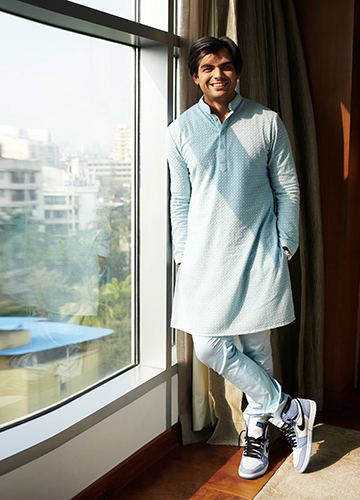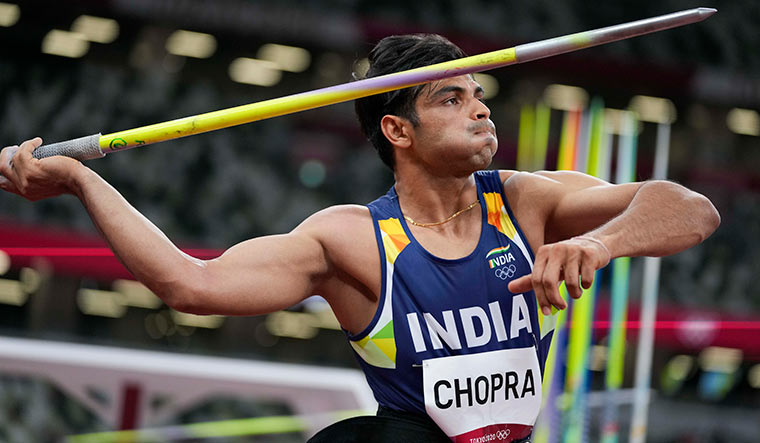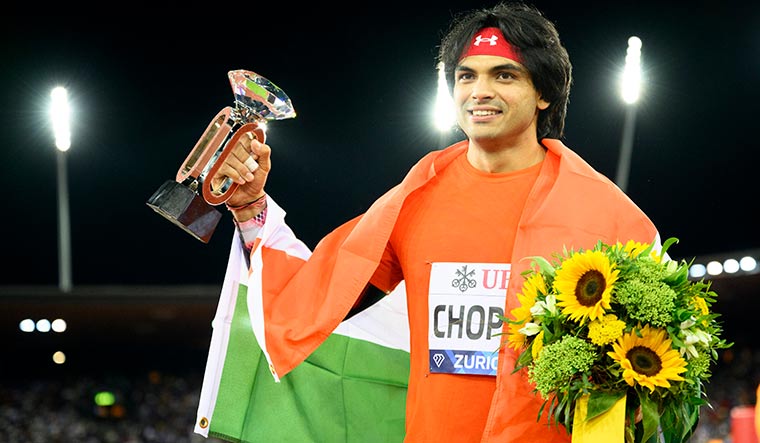After he won independent India’s first athletics gold at the Olympics, Neeraj Chopra went home and put on 12kg. His coach, the German Klaus Bartonietz, was miffed, but he knew his pupil would shed the kilos. For, you see, Neeraj Chopra is not one to rest on his laurels, of which there have been many. Only 24, Neeraj is one of the best javelin throwers in the world and arguably one of India’s greatest athletes. And though it might sound hyperbolic, his parabolic pursuits have indeed made him an inspiration to an entire generation of Indian athletes.
Neeraj was not born into a sporting family. The Chopra clan of Khandra village in Panipat consists of the patriarch grandfather, and his four sons and their families, who live together. Neeraj is the eldest grandchild, and has now inspired his cousins to also take up sport. The villagers, too, come to him for advice on where to send their children to train.
This year has been hectic for Neeraj. Not only did he compete in several international events, he added to his list of achievements by winning the silver medal at the World Athletics Championships and also became the first Indian to win a Diamond League final.
And, unlike after the Olympics, the downtime this year was not as relaxing. Yes, there was mom’s food, but he made sure he stayed within his ideal weight range by training at home. Also, it helps that his father and uncles do not let him just chill―he has to do farm work and other chores.
When out of Panipat, he was busy with ad shoots for the several brands he endorses. Managed by JSW Sports on and off the field, Neeraj has more than 10 brands in his kitty, ranging from sportswear to edutech companies. He also recently did a promotional video for the Marvel film Black Panther: Wakanda Forever.
With the off-season done, Chopra is now in Loughborough University in the UK with Bartonietz and physiotherapist Ishaan Marwaha.
Before he left, THE WEEK caught up with Neeraj to talk about life as an athletics superstar, the mini-revolution he has inspired, his talks with the younger generation and the season ahead. Excerpts:
Q\ Has life changed after the gold in Tokyo?
A\ Life keeps changing. It is not just about winning an Olympic medal. When I started playing or started going to school, then changed my school, things kept changing. But yes, a big change did come after I won the Olympic medal.
Q\ How?
A\ I now believe I do belong right up there among the top athletes. When I won the world junior [championships gold] and the Commonwealth and Asian Games medals (both gold), some people recognised me. But when I won at the Olympics, more people started recognising me. [I also gained more] confidence to perform under so much pressure. The results in later competitions have also been good. So yes, life has changed somewhat.
Q\ What does becoming an Olympic champion mean to you?
A\ An Olympic medal is considered the biggest in sports. Every athlete dreams of becoming an Olympic champion. Only some countries compete in the Commonwealth and Asian Games. The Olympics is bigger.
Q\ How does it feel when people recognise you and greet you as an Olympic champion?
A\ It feels different and nice. I won the World Championships medal this year. But when people greet you saying you have won the biggest medal for India, that you have made the country proud, it does feel different. Sometimes I am in a rush and I do not say much, but I try my best to stop and thank them.
Q\ Can you talk about the amount of work and the mindset that went into winning an Olympic medal? Did it become an obsession?
A\ Every competition I take part in, be it the nationals, the CWG, the Asian Games or the Olympics, I put in all I have. If we talk of the Olympics, it wasn’t my best throw. But yes, given the weather and the competition, it was a big challenge. It was a different experience.
Q\ When did you really feel that you were an Olympic champion?
A\ When Jakub’s (Vadlejch) last throw happened (84.93m), I was sure that I was winning gold (Neeraj threw 86.65m). But yeah, it did take time to get the real feel of becoming an Olympic champion. Too much was happening, the medal ceremony, dope test etc.
Maybe when the national anthem played was when it struck me that, yes, I had done something big. That night when I returned to the athletes’ village, everyone wanted to see the medal. I slept with the medal next to me.
Q\ It has been more than a year since Tokyo 2020. Tell us about the major changes in your life.
A\ Commercially, for example, more advertisements are coming my way, and better ones at that. It is important and also tough to balance all these demands and my own training. I have a good team that manages all this.
And as for my family, from the beginning I have not been able to spend time at home, but they have never let me feel that I am ignoring them. They treat me the same even now and make me work in the farms. I still make tea for guests and take lunch to those working in the fields.
Q\ Does the 90m talk irritate you?
A\ At one time, yes, there was the thought that I have to get to that mark. When I threw 89.94m at Stockholm (Diamond League, June 2022), and missed it by 6cm, I felt it a little. I wished I had crossed 90m. But then I realised that I have come so close that it will happen when it has to. I do not worry about it anymore.
Q\ But how do you block out the noise around it?
A\ (Laughs) All those who keep talking about it are most welcome to do it themselves. See, people who want to see me throw 90m do so with good intentions. I know that. At some level, they believe in me and know I can do it. But if I take the pressure, I may not be able to do the 88m-89m throws I do. I give my 100 per cent in a competition and do not go in thinking of a target.
Q\ Your competitors who have thrown 90m and beyond, and that too multiple times, were unable to do so at the Olympics. Why?
A\ There is some reason for sure. The Olympics come around once every four years and you have six throws. That’s it. There is the pressure of an entire nation. It does make a difference.
Q\ How has the off-season training been like this year?
A\ I train at home, too. I have a treadmill, cycle and cross trainer. This is the only time we get. The competitions end in September and restart in March-April. This is the time we get to spend time with family, and travel.
Q\ So are you feeling fresh with the break?
A\ This time is to relax, mentally, but I do enjoy myself the most when I am training. As an athlete, the most important thing is training and the stadium.
Q\ What have you been doing in the off-season?
A\ I did a few advertisements and went to Tokyo for the one-year anniversary. I met my relatives and did the Marvel ad. It was about throwing the javelin, so it was cool. When I have to do some acting, it is a bit challenging (smiles). But I feel nothing is more difficult than actual sport.
Q\ Have you discussed plans for the next season with coach Klaus?
A\ We discussed what we can work on, things that have scope for improvement, like strength and training.
Q\ How has the weight gain been this off season?
A\ I have been more careful this year. Last time, I did not control my eating or train enough.
Q\ You have started a javelin wave in India.
A\ The boys are doing very well. Manu D.P. threw 84m; Rohit Yadav and Yash Vir Singh are in 80m plus region. There is also Abhishek Singh (79.63m). It feels good that the sport I have chosen is growing in the country. The juniors consult me when we meet or on the phone. I try to share my experiences. They ask me about the World Championships experience. Rohit was with me there and we were motivating each other. It was his first international senior competition and while his qualification [throws] were good, the final did not go that well. I told him he has a long way to go, and to keep his focus on improvement.
Q\ You have won practically everything. How do you keep yourself motivated?
A\ I like it. Training three to four hours daily is a challenge, but there is a sense of satisfaction when you are tired after training.
Q\ While you were in Tokyo for the anniversary, Abhinav Bindra was there, too. What did you discuss? You had different journeys to the Olympic gold.
A\ Our sports are very different―shooting and javelin. I learnt about his experiences. He had competed in two Olympics before winning gold. He told me how his preparation was far better at Athens than in Beijing (where he won). I told him I work hard for the day I am competing; it is that one day, especially the Olympics. I try to make the most of the opportunity I get.
Q\ How do you keep negative thoughts away ahead of a competition? Do you do any mental training?
A\ I do not do special mental training. I listen to music and visualise. I feel those who are motivated and push themselves to give their best are mentally strong. As far as personal issues are concerned, there is no pressure as such from family.
Q\ How do you see javelin as a sport now?
A\ Earlier, people in my village were not aware of it. But what I have learnt is that, whatever we do, if we work hard at it, we can go as far as possible.
Q\ How has your approach to competition evolved?
A\ It has changed mentally and physically. Earlier, it was just simply about competing and aiming to win. Now, I am aware that, while competing with the best in the world, the result is not in our hands. I just have to give my best.
Q\ Is there anything your competitors have that you wish you had?
A\ Nothing. I have come this far and I am happy. I never feel I should be like the other guy or train like him.
Q\ You went with your uncle and friends to Switzerland. How was it?
A\ The main thing was that Surinder uncle came there after the Diamond League event in Switzerland. The result was good and then we went and explored the country. There was skydiving, paragliding and a canyon swing. It was important for him to have this holiday. Papa and Bhim uncle had come to Turkey (where he was training) earlier.




